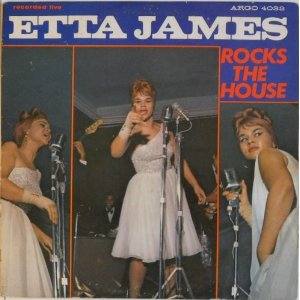
Mathis James Reed was an American blues musician and songwriter. His particular style of electric blues was popular with a wide variety of audiences. Reed's songs such as "Honest I Do" (1957), "Baby What You Want Me to Do" (1960), "Big Boss Man" (1961), and "Bright Lights, Big City" (1961) appeared on both Billboard magazine's R&B and Hot 100 singles charts.

Jamesetta Hawkins, known professionally as Etta James, was an American singer and songwriter. Starting her career in 1954, James frequently performed in Nashville's famed R&B clubs, collectively known as the Chitlin' Circuit, in the 1940s, 1950s, and 1960s. She sang in various genres, including gospel, blues, jazz, R&B, rock and roll, and soul, and gained fame with hits such as "The Wallflower" (1955), "At Last" (1960), "Something's Got a Hold on Me" (1962), "Tell Mama", and "I'd Rather Go Blind". She faced a number of personal problems, including heroin addiction, severe physical abuse, and incarceration, before making a musical comeback in the late 1980s with the album Seven Year Itch (1988).

Willie Mae "Big Mama" Thornton, was an American singer and songwriter of blues and R&B.

"Hound Dog" is a twelve-bar blues song written by Jerry Leiber and Mike Stoller. Recorded originally by Big Mama Thornton on August 13, 1952, in Los Angeles and released by Peacock Records in late February 1953, "Hound Dog" was Thornton's only hit record, selling over 500,000 copies, spending 14 weeks in the R&B charts, including seven weeks at number one. Thornton's recording of "Hound Dog" is listed as one of the Rock and Roll Hall of Fame's "500 Songs That Shaped Rock and Roll", ranked at 318 in the 2021 iteration of Rolling Stone's 500 Greatest Songs of All Time and was inducted into the Grammy Hall of Fame in February 2013.

Reggie Grimes Young Jr. was an American musician who was lead guitarist in the American Sound Studio house band, The Memphis Boys, and was a leading session musician.
Country USA was a 23-volume series issued by Time-Life Music during the late 1980s and early 1990s, spotlighting country music of the 1950s through early 1970s.

Etta James Rocks the House is the first live album by the American singer Etta James. It was recorded live on the nights of September 27 and 28, 1963, at the New Era Club in Nashville, Tennessee, and was released on December 13, 1963.

"Rock Me Baby" is a blues standard that has become one of the most recorded blues songs of all time. It originated as "Rockin' and Rollin'", a 1951 song by Lil' Son Jackson, itself inspired by earlier blues. Renditions by Muddy Waters and B.B. King made the song well-known. When B.B. King's recording of "Rock Me Baby" was released in 1964, it became his first single to reach the Top 40 in Billboard magazine's Hot 100 chart.

Black Magic is a studio album by Chicago blues musician Magic Sam. Delmark Records released it under the name of "Magic Sam Blues Band" in November 1969, shortly before his death. The album was a follow-up to Magic Sam's highly influential studio debut, West Side Soul (1968), and also includes a mix of originals with songs written by his contemporaries.
"Big Boss Man" is a blues song first recorded by Jimmy Reed in 1960. It became one of his most popular songs, although the songwriting is credited to Luther Dixon and Al Smith. Chicago-based Vee-Jay Records released it as a single, which became one of Reed's last appearances on the record charts. The song has been recorded by artists in diverse styles, including Elvis Presley, B.B. King, and Hope Sandoval, who also had chart successes with the song.
"Bright Lights, Big City" is a classic blues song which was written and first recorded by American bluesman Jimmy Reed in 1961. Besides being "an integral part of the standard blues repertoire", "Bright Lights, Big City" has appealed to a variety of artists, including country and rock musicians, who have recorded their interpretations of the song.
"My Baby Left Me" is a rhythm and blues song written by blues singer Arthur Crudup.
Luther Dixon was an American songwriter, record producer, and singer. Dixon's songs achieved their greatest success in the 1950s and 1960s, and were recorded by Elvis Presley, the Beatles, the Jackson 5, B.B. King, Jerry Lee Lewis, Dusty Springfield, Jimmy Reed and others. As a producer, Dixon helped create the signature sound of the girl group the Shirelles.

"That's All Right"or "That's Alright" is a blues song adapted by Chicago blues singer and guitarist Jimmy Rogers. He recorded it in 1950 with Little Walter on harmonica. Although based on earlier blues songs, music writer John Collis calls Rogers' rendition "one of the most tuneful and instantly memorable of all variations on the basic blues format". The song became a blues standard and has been recorded by numerous blues and other artists.

"You Don't Love Me" is a rhythm and blues-influenced blues song recorded by American musician Willie Cobbs in 1960. Adapted from Bo Diddley's 1955 song "She's Fine She's Mine", it is Cobbs' best-known song and features a guitar figure and melody that has appealed to musicians in several genres.
"Milk Cow Blues" is a blues song written and originally recorded by Kokomo Arnold in September 1934. In 1935 and 1936, he recorded four sequels designated "Milk Cow Blues No. 2" through No. 5. The song made Arnold a star, and was widely adapted by artists in the blues, Western swing and rock idioms.

"Ain't That Lovin' You, Baby" is an upbeat blues song, written and recorded by Jimmy Reed. The single reached number eight in the US Billboard R&B chart in late March 1956. Backing Reed are Eddie Taylor (guitar), Vernel Fournier (drums), and an unknown guitarist.











